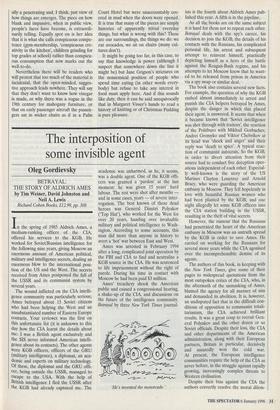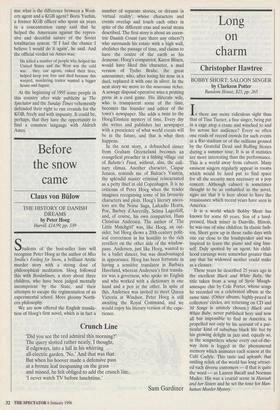The interposition of some invisible agent
Oleg Gordievsky
BETRAYAL: THE STORY OF ALDRICH AMES by Tim Weiner, David Johnston and Neil A. Lewis Richard Cohen Books, £12.99, pp. 308 In the spring of 1985 Aldrich Ames, a medium-ranking officer of the CIA, offered his services to the KGB. He worked for Soviet/Russian intelligence for the following nine years, giving Moscow an enormous amount of American political, military and intelligence secrets, dealing an enormous blow to the international posi- tion of the US and the West. The secrets received from Ames postponed the fall of the USSR and its communist system by several years.
The wound inflicted on the CIA intelli- gence community was particularly serious; Ames betrayed about 15 Soviet citizens who had been helping the West and an unsubstantiated number of Eastern Europe contacts. Your reviewer was the first on this unfortunate list (it is unknown to this day how the CIA learnt the details about me: I was a British agent exclusively and the SIS never informed American intelli- gence about its contacts). The other agents were KGB officers, officers of the GRU (military intelligence), a diplomat, an aca- demic and experts on military technology. Of these, the diplomat and the GRU offi- cer, being outside the USSR, managed to escape to the USA. With the help of British intelligence I fled the USSR after the KGB had already captured me. The academic was unharmed, as he, it seems, was a double agent. One of the KGB offi- cers was granted a 'pardon' at the last moment: he was given 15 years' hard labour. The rest were shot after months and in some cases, years — of severe inter- rogation. The best known of these dead heroes was General Dimitri Polyakov (`Top Hat'), who worked for the West for over 20 years, handing over invaluable military and political intelligence to Wash- ington. According to some accounts, this man did more than anyone in history to avert a 'hot' war between East and West.
Ames was arrested in February 1994 after a long, complicated joint operation by the FBI and CIA to find and neutralise a KGB source in the CIA. He was sentenced to life imprisonment without the right of parole. During his time in contact with Moscow he had been paid $3 million.
Ames' treachery shook the American public and caused a congressional hearing, a shake-up of the CIA, and discussions on the future of the intelligence community. Betrayal by three New York Times journal- `He's invented the motorcade.' ists is the fourth about Aldrich Ames pub- lished this year. A fifth is in the pipeline.
As all the books are on the same subject it is hard for them not to repeat each other. Betrayal deals with the spy's career, his decision to join the KGB, the details of his contacts with the Russians, his complicated personal life, his arrest and subsequent attempt to reinvent himself, practically depicting himself as a hero of the battle against the Reagan-Bush regime, and his attempts to let Moscow know that he want- ed to be released from prison in America via a spy swap or similar deal.
The book also contains several new facts. For example, the question of why the KGB rushed almost immediately to arrest and punish the CIA helpers betrayed by Ames, despite the danger in which this placed their agent, is answered. It seems that when it became known that 'Soviet intelligence was shot through with traitors', the reaction of the Politburo with Mikhail Gorbachev, Andrei Gromyko and Viktor Chebrikov at its head was 'shock and anger' and their reply was 'death to spies'. A typical reac- tion of communist autocrats. So the KGB, in order to divert attention from their source had to conduct five deception oper- ations independent of each other. Especial- ly well-known is the story of the US Marines Clayton Lonetree and Arnold Bracy, who were guarding the American embassy in Moscow. They fell hopelessly in love with beautiful Russian women who had been planted by the KGB, and one night allegedly let some KGB officers into the CIA station building in the USSR, resulting in the theft of vital secrets.
However, the rumour that the Russians had penetrated the heart of the American embassy in Moscow was an untruth spread by the KGB in order to save Ames. He carried on working for the Russians for several more years while the CIA agonised over the incomprehensible demise of its agents.
The authors of this book, in keeping with the New York Times, give some of their pages to widespread quotations from the most outspoken critics of the CIA, who, in the aftermath of the unmasking of Ames, blamed the agency for all manner of sins and demanded its abolition. It is, however, an undisputed fact that in the difficult con- ditions of opposition to communist totali- tarianism, the CIA achieved brilliant results. It was a great coup to recruit Gen- eral Polyakov and the other dozen or so Soviet officials. Despite their loss, the CIA and other departments of the American administration, along with their European partners, Britain in particular, decisively and assuredly won the cold war. At present, the European intelligence communities require the help of the CIA as never before, in the struggle against rapidly growing, increasingly complex threats to Western civilisation.
Despite their bias against the CIA the authors correctly resolve the moral dilem- ma: what is the difference between a West- ern agent and a KGB agent? Boris Yuzhin, a former KGB officer who spent six years in a concentration camp said that he helped the Americans against the repres- sive and deceitful nature of the Soviet totalitarian system. 'If I had the chance I believe I would do it again', he said. And the official verdict on Ames was:
He killed a number of people who helped the United States and the West win the cold war. . . they, our agents, risked their lives, helped keep you free and died because this warped, murdering traitor wanted a bigger house and Jaguar.
At the beginning of 1995 some people in this country after wide publicity in The Spectator and the Sunday Times vehemently defended their right to run errands for the KGB, freely and with impunity. It could be, perhaps, that they have the opportunity to find a common language with Aldrich Ames.



















































 Previous page
Previous page